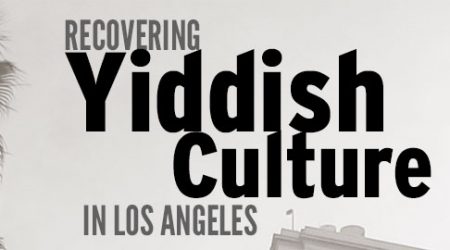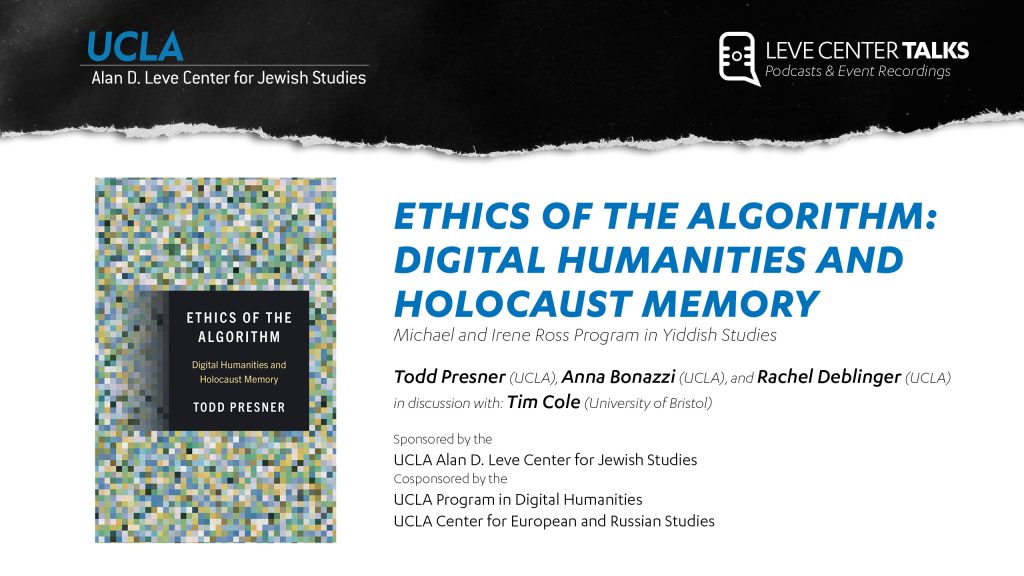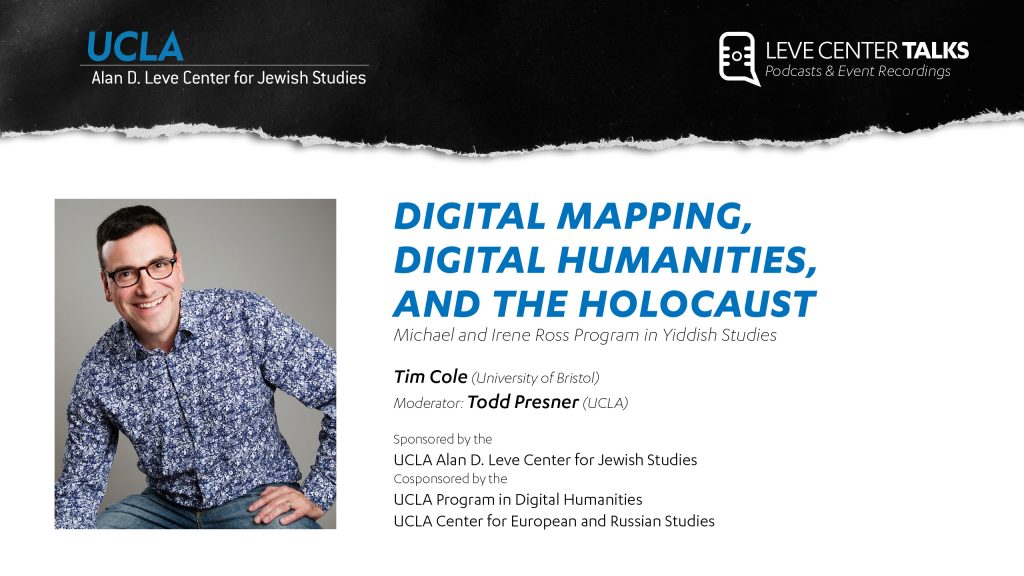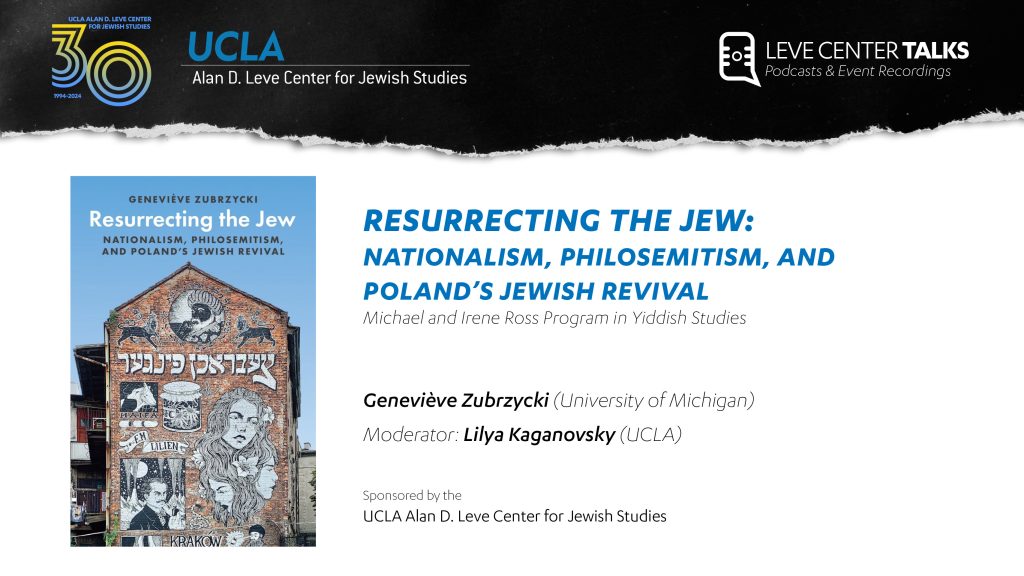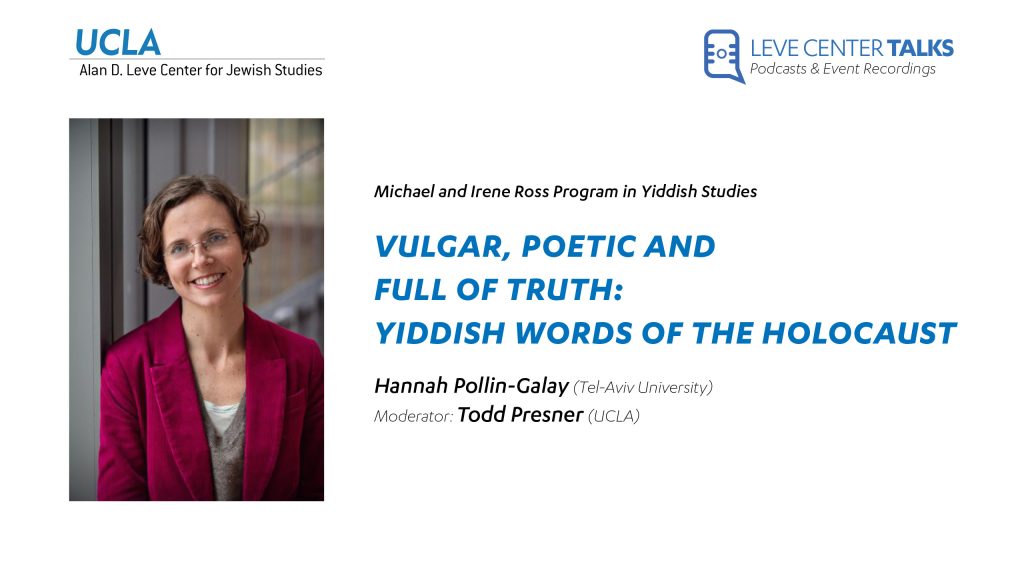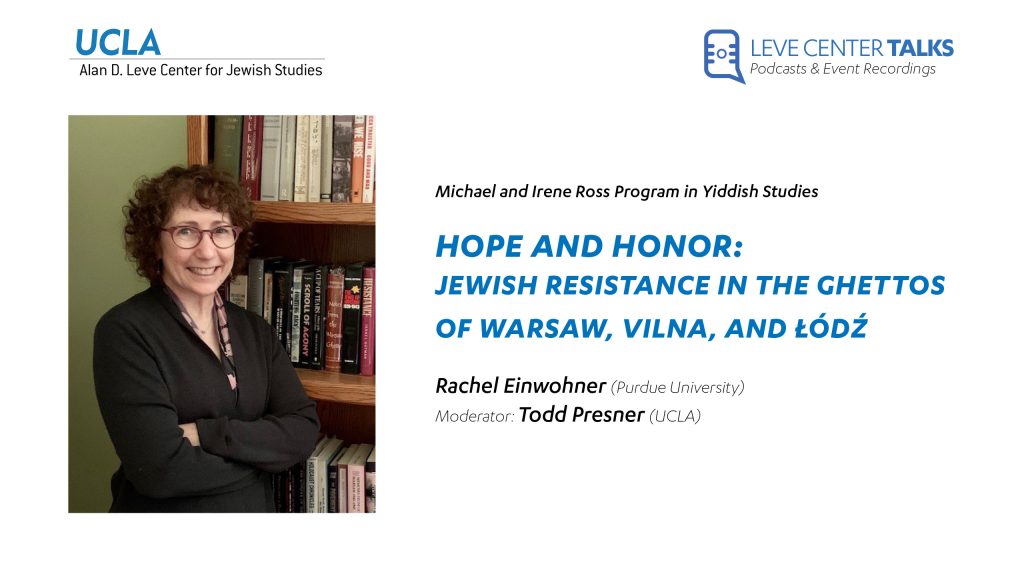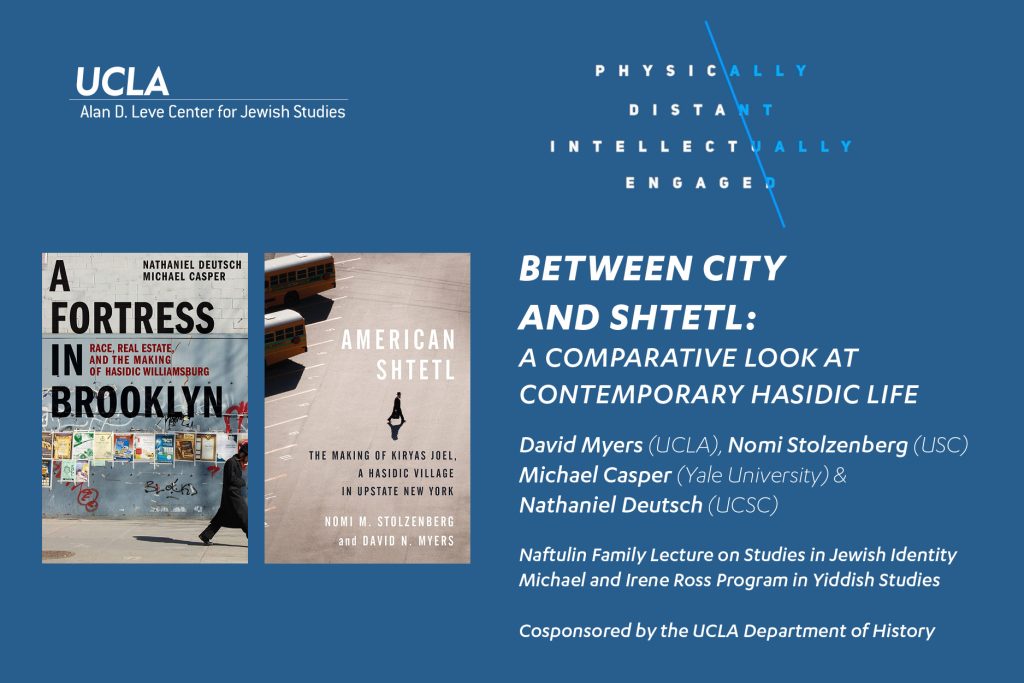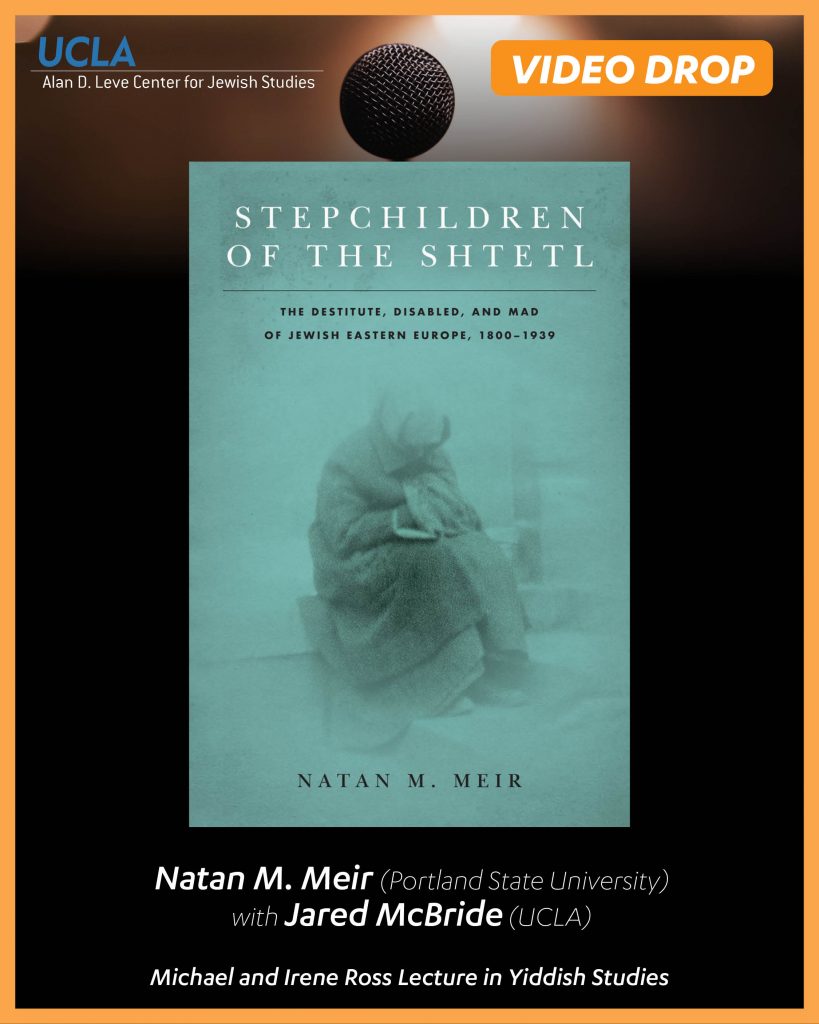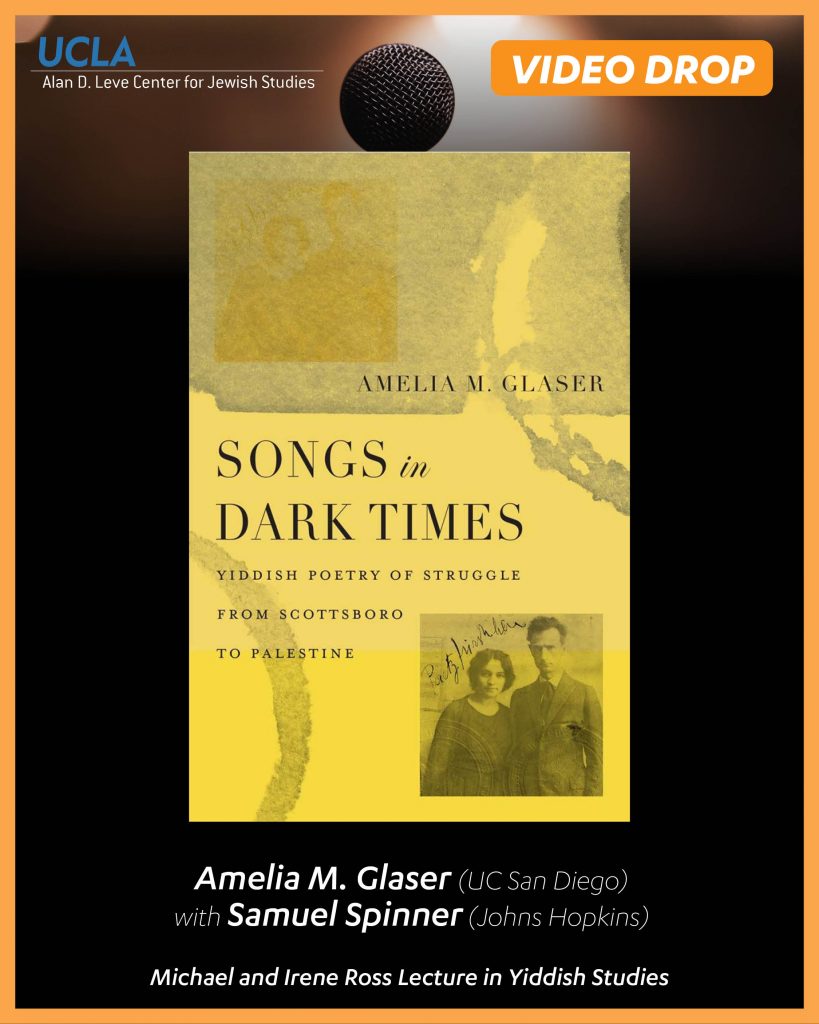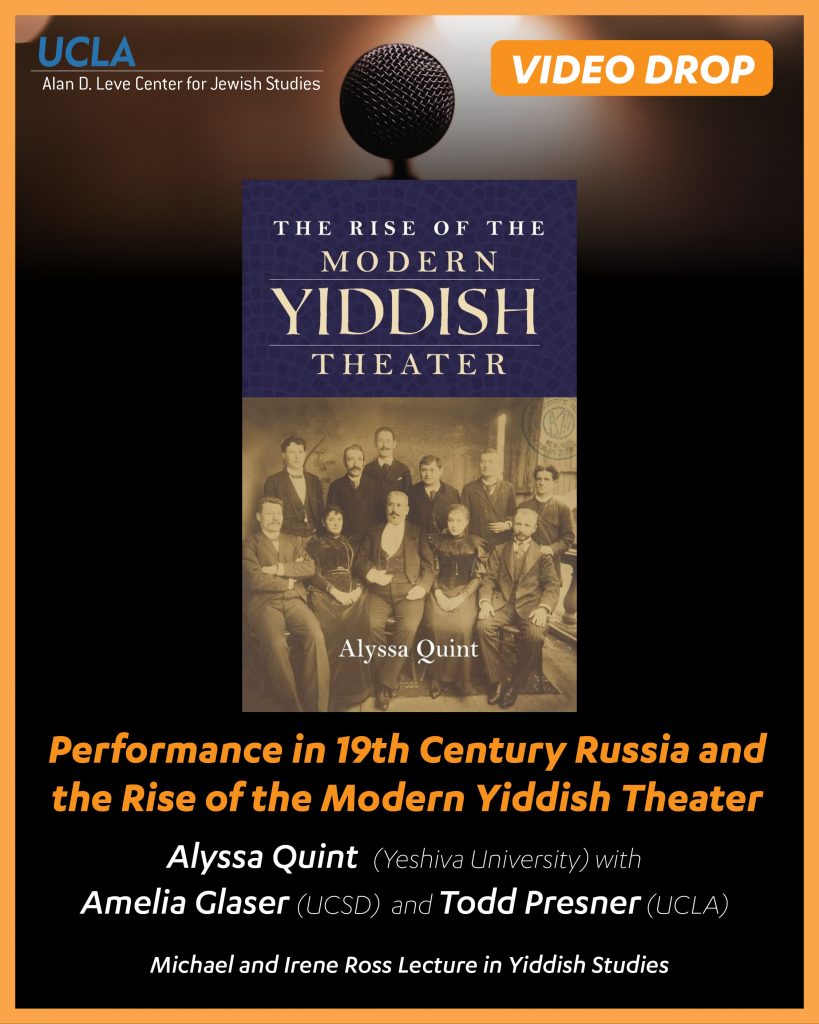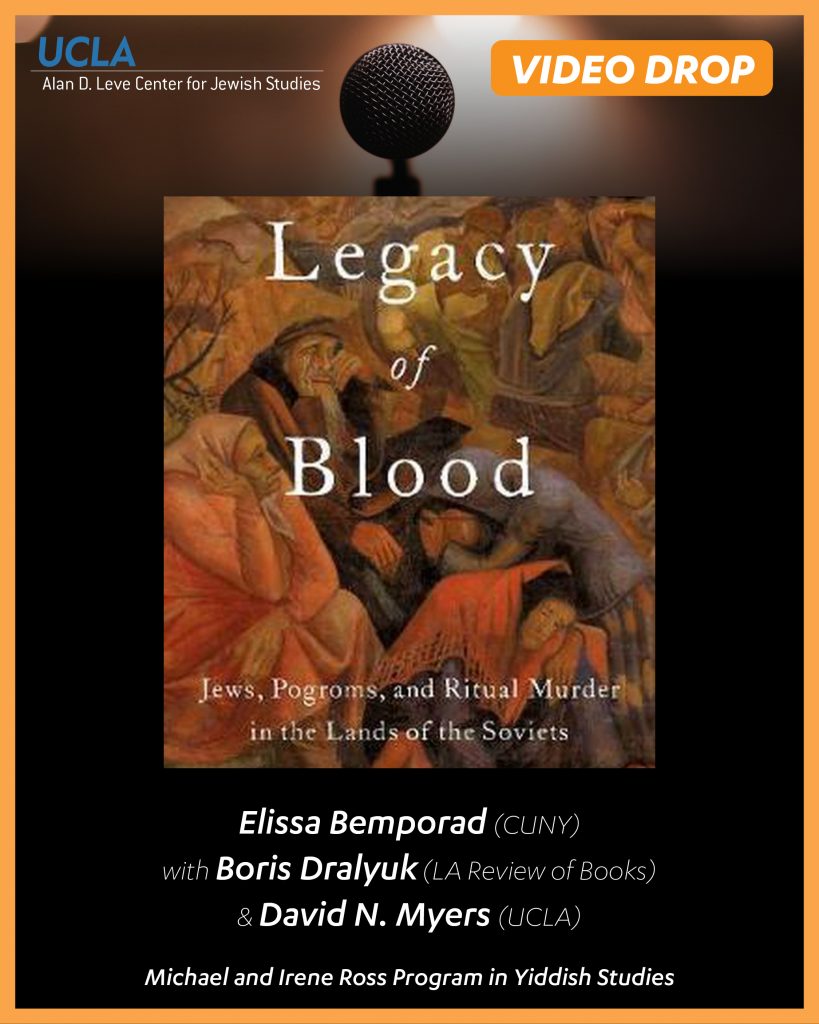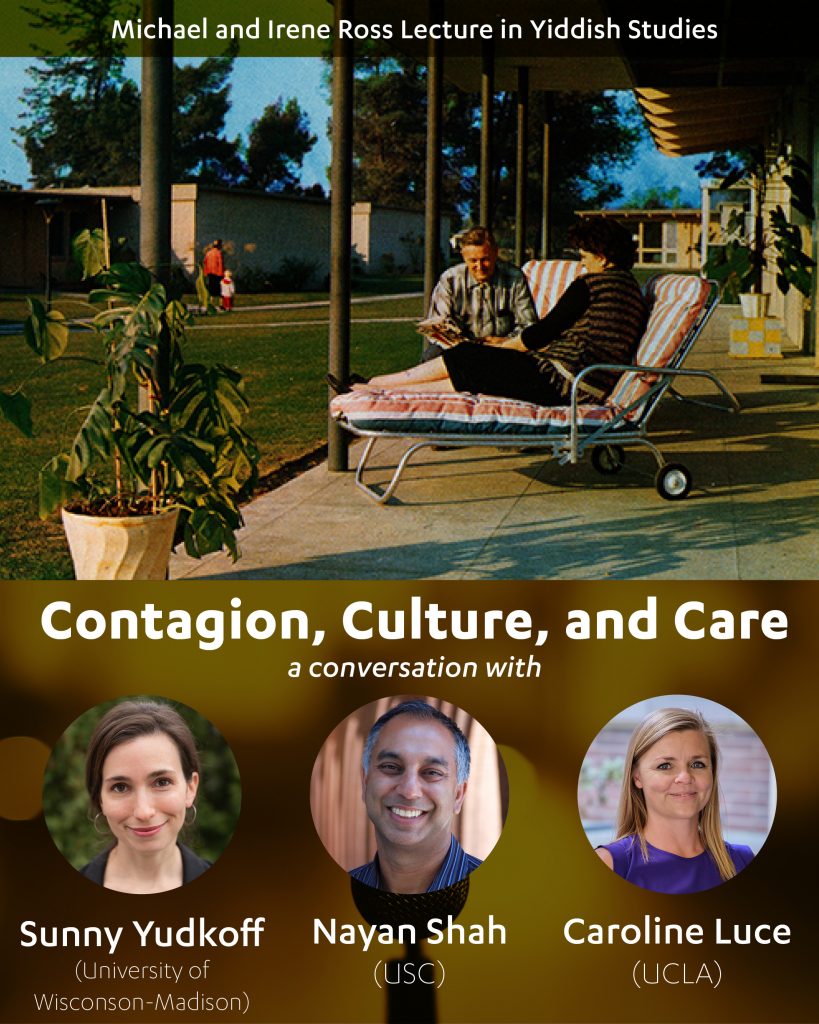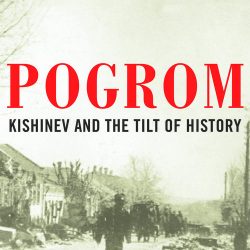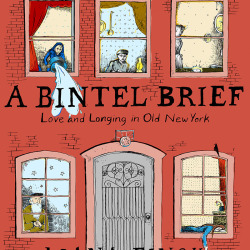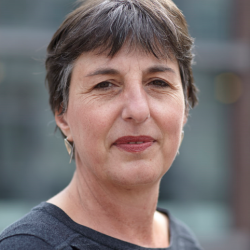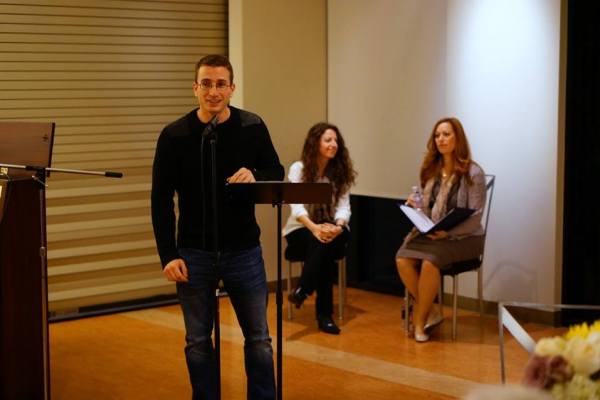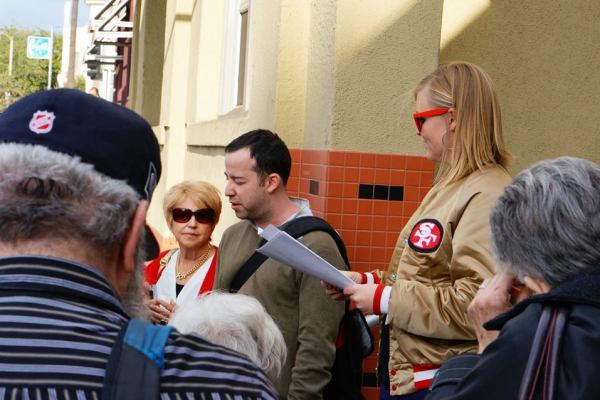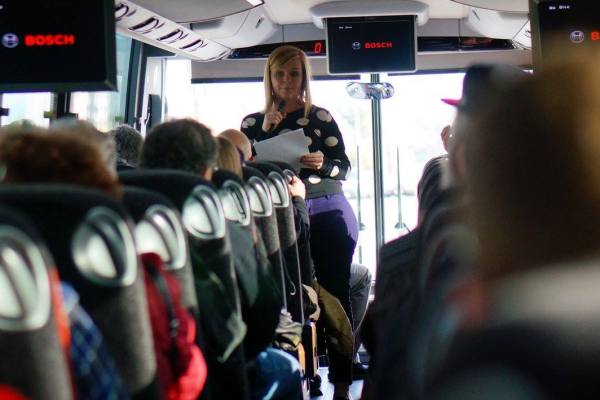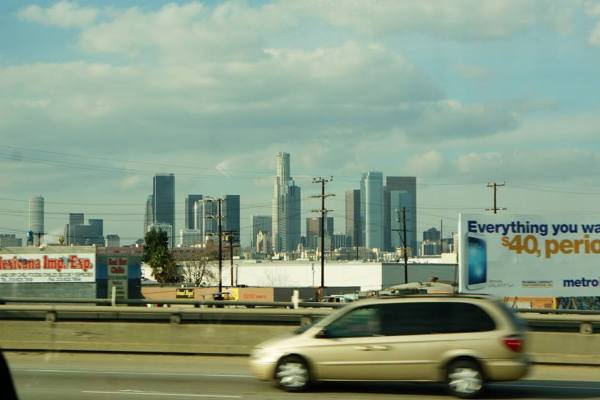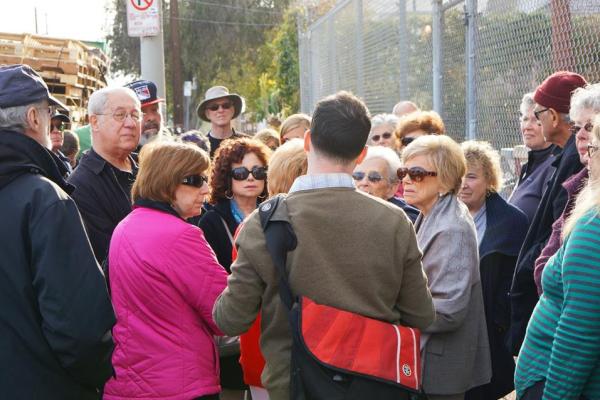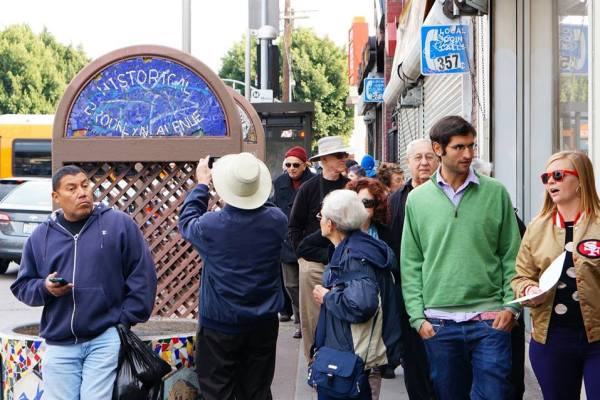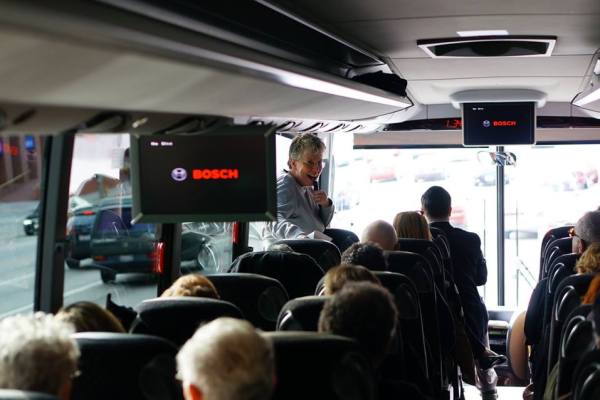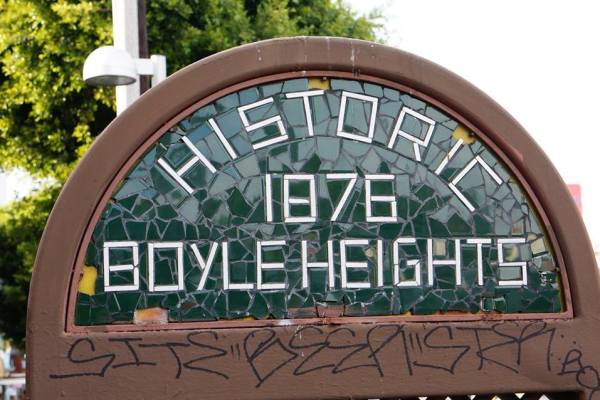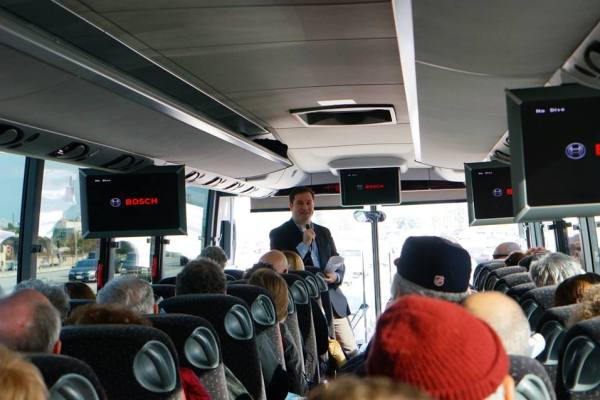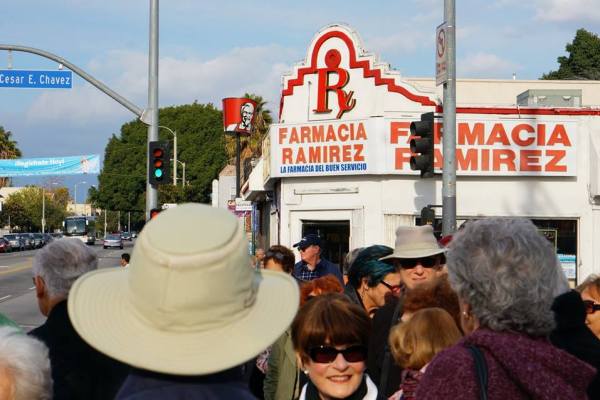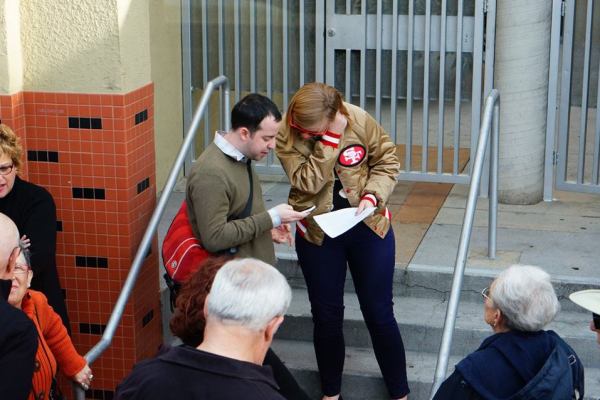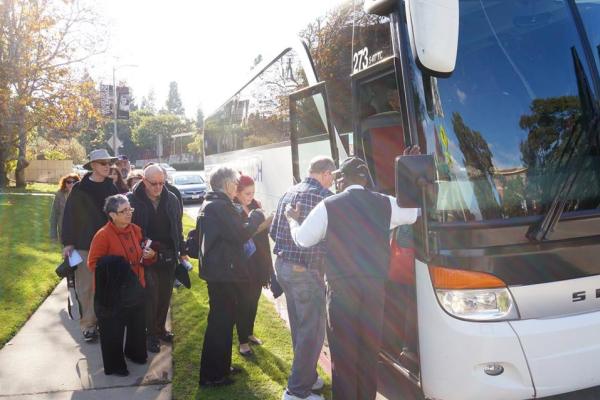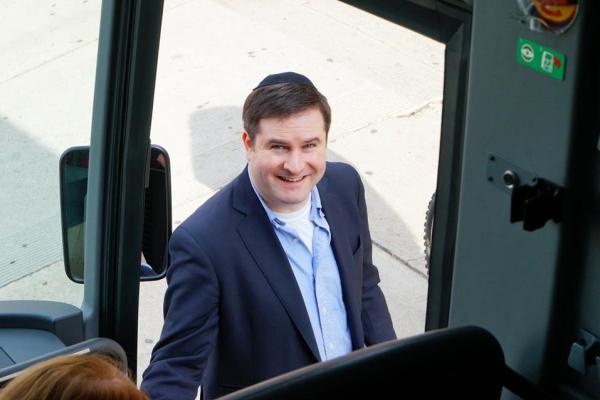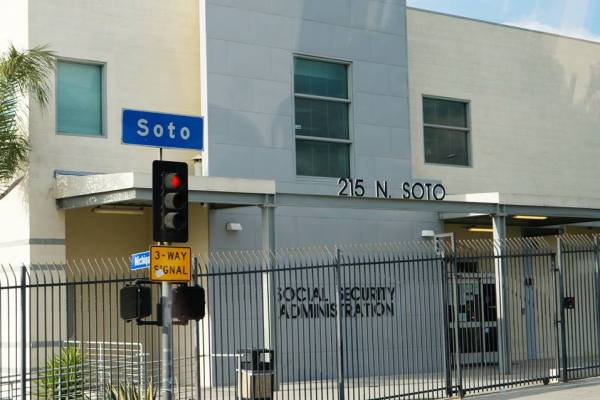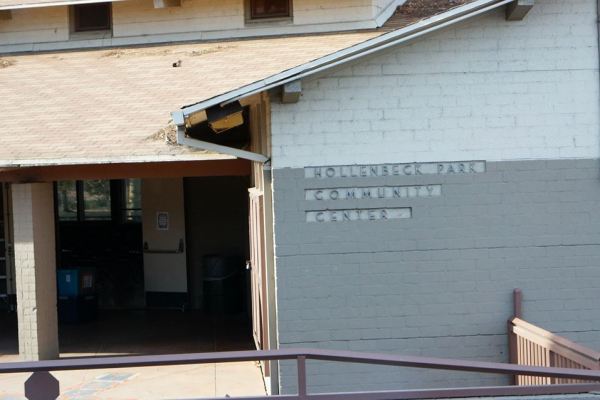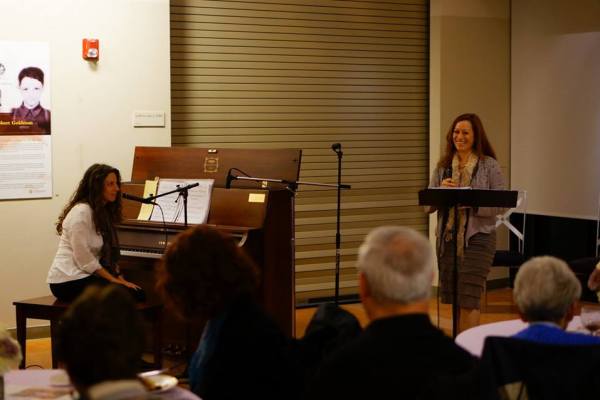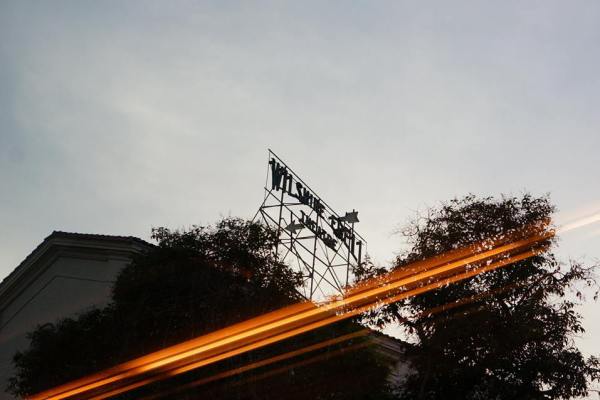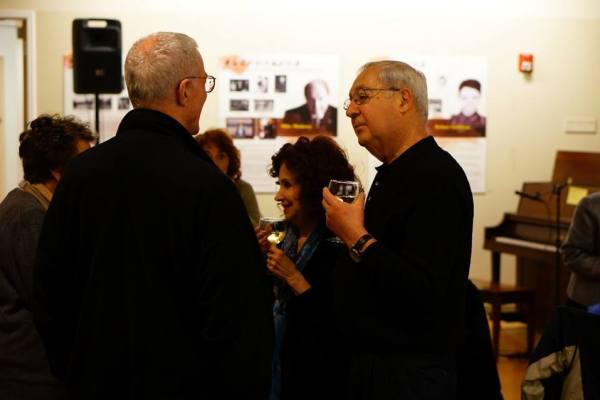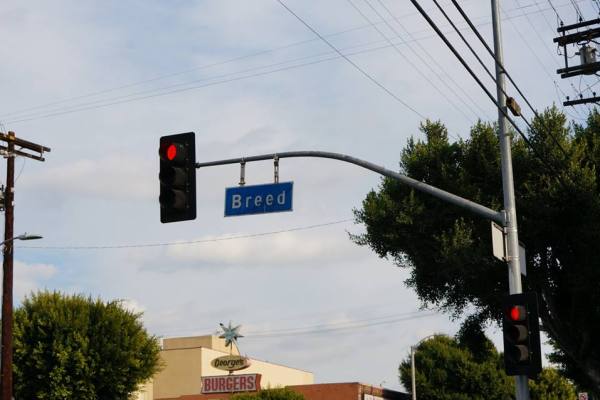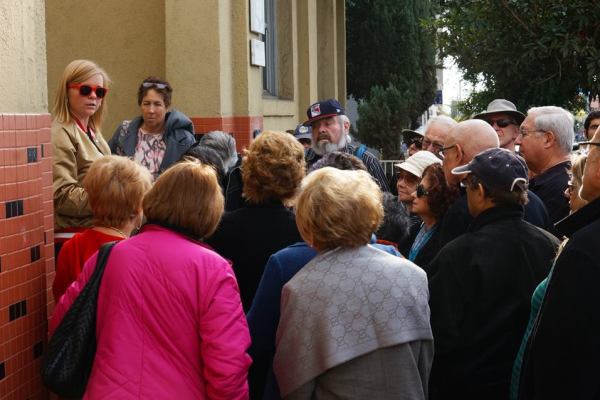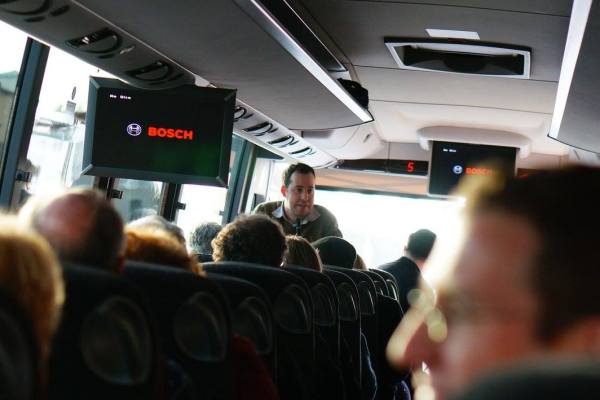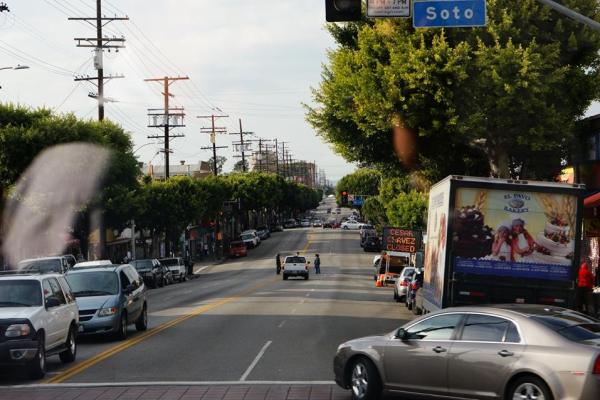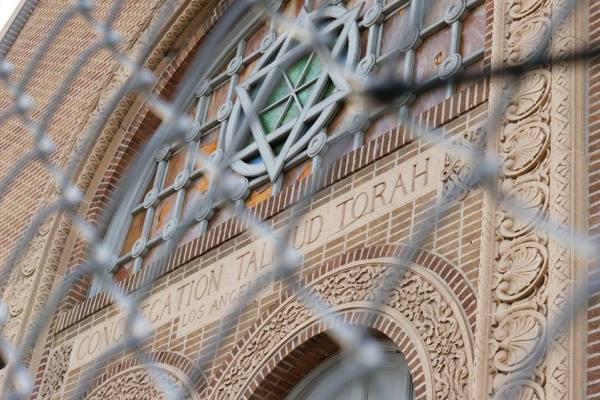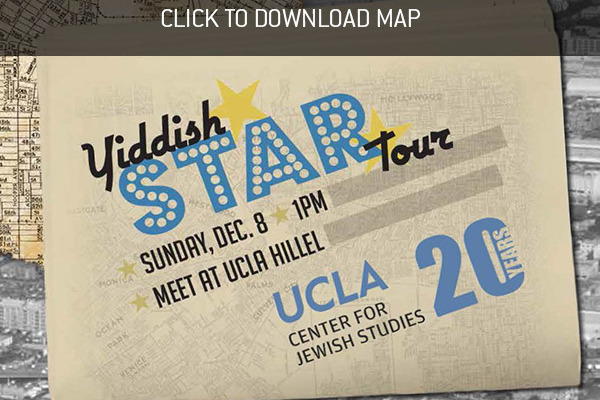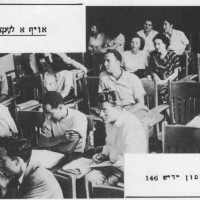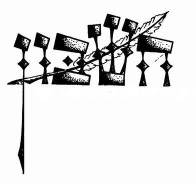Mapping Jewish L.A. Exhibit
Recovering Yiddish Culture in Los Angeles
Mapping Jewish L.A. Exhibit, curated by Caroline Luce
“Recovering Yiddish Culture in Los Angeles” aims to apply the digital strategies that have so greatly enhanced the field of Yiddish Studies to recover a long-forgotten body of Yiddish works: those produced by the Yiddish writers and poets who settled in Los Angeles. Published in small batches thousands of miles from the cultural capitols of Europe and the American east coast, these works – nearly 100 books and several dozen periodicals – have received very little scholarly attention.
Yiddish Studies Events 2024-2025
Ethics of the Algorithm: Digital Humanities and Holocaust Memory
Todd Presner (UCLA), Anna Bonazzi (UCLA), and Rachel Deblinger (UCLA) Moderator: Tim Cole (University of Bristol)
February 6, 2025
The Holocaust is one of the most documented events in history, with vast archives of audio, video, and written testimonies. Analyzing these resources manually would take lifetimes, but computational methods offer a way to process them more efficiently. This book by Presner and colleagues explores the ethical implications of using algorithms to “listen” to Holocaust testimonies. They propose developing an “ethics of the algorithm” that balances the need for ethical listening with the possibilities of digital tools. The book covers various technologies, from early computational approaches to AI-driven testimonies that simulate real conversations with survivors.
Michael and Irene Ross Program in Yiddish Studies
Cosponsored by the UCLA Program in Digital Humanities and the UCLA Center for European and Russian Studies
Digital Mapping, Digital Humanities, and the Holocaust
Tim Cole (University of Bristol) Moderator: Todd Presner (UCLA)
February 4, 2025
This talk draws on over ten years of experimenting with digital humanities methods – in particular digital mapping – to study the Holocaust. As well as suggesting the ways that a range of digital methods can uncover new knowledge through distant reading the archive, mapping spatial patterns, or digital reading against the grain, the talk also reflects on the limitations of such approaches. It asks when and how we decide to use, and not use, digital tools and methods in researching the Holocaust, and what kinds of new digital tools we might want to develop as well as when we choose to adopt more traditional analog methods.
Michael and Irene Ross Program in Yiddish Studies
Cosponsored by the UCLA Program in Digital Humanities and the UCLA Center for European and Russian Studies
Yiddish Studies Events 2023-2024
Resurrecting the Jew: Nationalism, Philosemitism, and Poland’s Jewish Revival
Geneviève Zubrzycki (University of Michigan) Moderator: Lilya Kaganovsky (UCLA)
April 16, 2024
Since the early 2000s, Poland has experienced a remarkable Jewish revival, largely driven by non-Jewish Poles with a passionate new interest in all things Jewish. Klezmer music, Jewish-style restaurants, kosher vodka, and festivals of Jewish culture have become popular, while new museums, memorials, Jewish studies programs, and Holocaust research centers reflect soul-searching about Polish-Jewish relations before, during, and after the Holocaust. In Resurrecting the Jew, Geneviève Zubrzycki examines this revival and asks what it means to try to bring Jewish culture back to life in a country where 3 million Jews were murdered and where only about 10,000 Jews now live.
Michael and Irene Ross Program in Yiddish Studies
Yiddish Studies Events 2022-2023
Vulgar, Poetic and Full of Truth: Yiddish Words of the Holocaust
Hannah Pollin-Galay (Tel Aviv University) Moderator: Todd Presner (UCLA)
May 15, 2023
During and immediately after WWII, East European Jews perceived a radical transformation in the Yiddish language. This perception inspired some intellectuals to create dictionaries or glossaries that could map out and decode the metamorphosis of Yiddish words. Others incorporated this new strain of Yiddish into their poetry and prose. This talk will explore Khurbn Yiddish (Yiddish of the Holocaust) as a form of Holocaust memory and as a testament to the sensation of speech under genocidal conditions.
Michael and Irene Ross Program in Yiddish Studies
Hope and Honor: Jewish Resistance in the Ghettos of Warsaw, Vilna, and Łódź
Rachel L. Einwohner (Purdue University) Moderator: Todd Prenser (UCLA)
May 3, 2023
Most popular accounts of the Holocaust depict Jewish people as passive victims who went to their deaths “like sheep.” A common question is, “Why didn’t they resist?” In this talk, I ask the opposite question: Why did Jewish people resist? I pose the question this way because from the perspective of theory and research on social movements, collective Jewish resistance should not have happened. By comparing resistance efforts in the ghettos of Nazi-occupied Warsaw, Vilna, and Łódź, I argue that decisions about resistance rested on ghetto residents’ assessments of the threats facing them, and somewhat ironically, armed resistance took place only once activists reached the critical conclusion that they had no hope for survival.
Michael and Irene Ross Program in Yiddish Studies
Yiddish Studies Events 2021-2022
Between City and Shtetl: A Comparative Look at Contemporary Hasidic Life
David N. Myers (UCLA), Nomi Stolzenberg (USC), Michael Casper (Yale University), and Nathaniel Deutsch (UCSC)
May 24, 2022
Joint book talk featuring current and former Leve affiliates. This talk brings together David N. Myers (UCLA) and Nomi M. Stolzenberg (USC), authors of American Shtetl: The Making of Kiryas Joel, a Hasidic Village in Upstate New York, with Michael Casper (PhD in History, UCLA 2019) and Nathaniel Deutsch (UCSC), authors of A Fortress in Brooklyn: Race, Real Estate, and the Making of Hasidic Williamsburg, for a scintillating discussion on these exciting new books on the Hasidim of New York.
Naftulin Family Lecture on Studies in Jewish Identity
Michael and Irene Ross Program in Yiddish Studies
Yiddish Studies Events 2020-2021
Stepchildren of the Shtetl: The Destitute, Disabled, and Mad of Jewish Eastern Europe, 1800-1939
Natan M. Meir (Portland State University) with Jared McBride (UCLA)
May 18, 2021
Stepchildren of the Shtetl examines the lives and roles of the outcasts of Jewish society in eastern Europe – beggars, madmen and madwomen, disabled people, and poor orphans – and argues that, despite their marginal status, they played an important symbolic role in the process of modernization over the nineteenth and early twentieth centuries.
Michael and Irene Ross Lecture in Yiddish Studies
Songs in Dark Times: Yiddish Poetry of Struggle from Scottsboro to Palestine
Amelia Glaser (UC San Diego) with Samuel Spinner (Johns Hopkins)
May 12, 2021
Between the world wars, a generation of Jewish leftist poets reached out to other embattled peoples of the earth—Palestinian Arabs, African Americans, Spanish Republicans—in Yiddish verse. Songs in Dark Times examines the richly layered meanings of this project, grounded in Jewish collective trauma but embracing a global community of the oppressed. The long 1930s, Amelia M. Glaser proposes, gave rise to a genre of internationalist modernism in which tropes of national collective memory were rewritten as the shared experiences of many national groups. The utopian Jews of Songs in Dark Times effectively globalized the pogroms in a bold and sometimes fraught literary move that asserted continuity with anti-Arab violence and black lynching.
Michael and Irene Ross Lecture in Yiddish Studies
Performance in 19th Century Russia and the Rise of the Modern Yiddish Theater
Alyssa Quint (Yeshiva University) with Amelia Glaser (UCSD) and Todd Presner (UCLA)
February 16, 2021
The institution of the modern Yiddish theater coalesced in a short period (from roughly 1876 to 1883) under the stewardship of a Russian-Jewish intellectual named Avrom Goldfaden, known as the father of the Yiddish theater. In composing and producing these first works of the public stage, Goldfaden pulled from Yiddish folk motifs and folksongs, and integrated comic routines from the performance culture of traditional wedding jesters and Purim performers who counted among his first actors. He also borrowed music and forms from the Western opera and operetta tradition. But Goldfaden’s most far-reaching cultural intervention was his creation of an urban-based and public Jewish culture that exuded a sense of belongingness to bourgeois Russian society, a belongingness we do not usually associate with Jews of late Imperial Russia. Goldfaden embodied and modeled the art of celebrity, self-fashioning, and social performance.
Michael and Irene Ross Lecture in Yiddish Studies
The Blood Libel in Modern Eastern Europe: A Social History
Elissa Bemporad (CUNY) in conversation with Boris Dralyuk (LA Review of Books) and David N. Myers (UCLA)
October 20, 2020
In our latest virtual book talk, Elissa Bemporad (Queens College) discusses her book Legacy of Blood: Jews, Pogroms, and Ritual Murder in the Land of the Soviets (2019) with David N. Myers (UCLA) and Boris Dralyuk (L.A. Review of Books). Together, they consider the persistence, permutations, and responses to antisemitic violence and how ritual murder accusations can be used as a canvas to explore neighborhood sociology, memory, and violence in modern society.
Michael and Irene Ross Lecture in Yiddish Studies
Yiddish Studies Events 2019-2020
Contagion, Culture, and Care
Sunny Yudkoff (University of Wisconsin-Madison), Nayan Shah (USC), and Caroline Luce (UCLA)
June 3, 2020
How do we come to understand and give meaning to epidemics? How do communities respond and give care? This webinar will bring together two scholars whose innovative approaches have advanced our understanding of the history of disease in multiethnic American life – Prof. Nayan Shah, author of Contagious Divides: Epidemics and Race in San Francisco’s Chinatown, and Prof. Sunny Yudkoff, author of Tubercular Capital: Illness and the Conditions of Modern Jewish Writing – to explore the resonances of their work in our current moment with host Dr. Caroline Luce (creator of “The White Plague in the City of Angels”).
Yiddish Studies Events 2018-2019
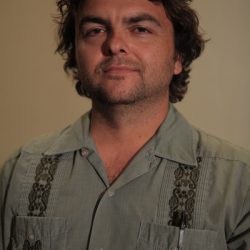
Radicals in the Barrio
JUSTIN AKERS CHACÓN (Author)
October 16, 2018
The lecture will cover a comprehensive study of the long and rich history of political radicalism within the Mexican and Chicano working class in the United States. Chacón will place emphasis on the contributions of Mexican radicals, Jews, and other immigrant groups to the labor movement in early 20th century Los Angeles.
Pogrom: Kishinev and the Tilt of History
Steven J. Zipperstein (Stanford)
January 24, 2019
Kishinev’s 1903 pogrom was the first instance in Russian Jewish life where an event received international attention. The riot, leaving 49 dead in an obscure border town, dominated headlines in the western world for weeks. It intruded on Russian-American relations and inspired endeavors as widely contradictory as the Hagannah, the precursor to the Israeli army, the NAACP, and the first version of “The Protocols of the Elders of Zion.” How did this incident come to define so much, and for so long?
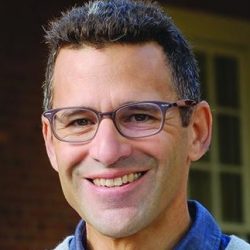
The Matter of the Neighbor: Budd Schulberg, James Baldwin, and the Watts Writers Workshop
Dean Franco (Wake Forest College)
February 28, 2019
This talk explores the Watts Writers Workshop, founded in the heart of Watts by Jewish American writer Budd Schulberg immediately after the Watts Rebellion of 1965. To explore Schulberg’s outsider-insider status, it investigates a conversation between Schulberg and James Baldwin, recalibrating what “Jewish” and “black” meant to each other in Watts and beyond.
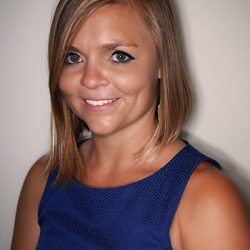
The Bund in the Borderlands
Caroline Luce (UCLA)
April 18, 2019
In this lecture, Dr. Caroline Luce will offer a preview of her book-in-progress, Yiddish in the Land of Sunshine: Jewish Radicalism, Labor and Culture in Los Angeles, 1900-1950. The book follows a group of young Jewish radicals – most veterans of the Russian Revolution of 1905 – as they moved from the borderlands of the Russian Empire to the borderlands of Southern California and then into the multiethnic “borderhood” of Boyle Heights.
Mickey Ross Program in Yiddish Studies Events 2014-2015
A Bintel Brief: Love and Longing in Old New York
November 13, 2014
The original “A Bintel Brief” (“A Bundle of Letters”) was an advice column for Jews fresh off the boat in The Jewish Daily Forward, a.k.a. The Forverts, a feature regarded by many as the prototype for “Dear Abby.” This seminar will discuss Liana Finck’s new, widely acclaimed graphic novel, A Bintel Brief: Love and Longing in Old New York (Ecco, 2014), which brings a selection of these letters to life and includes an imaginative conversation with the paper’s editor, Abraham Cahan.
Kol Nidre on Broadway: New Perspectives on the success of the Jazz Singer
May 12, 2015
Based upon extensive research on the marketing and reception of The Jazz Singer, the first “talking picture” and the hit movie of 1927-28, Judith Thissen sheds a different light on its enormous success at the box-office. She positions the Warner Bros. production in the broader context of the commercialization of the High Holidays and the efforts of Broadway picture palaces to attract Jewish holidaymakers by integrating Jewish elements into their shows around Rosh Hashanah and Yom Kippur.
Yiddish Star Tour
December 8, 2013
Los Angeles was once a center of Yiddish culture, trailing New York in size but not in quality! This special tour visited where the “stars” of Yiddish culture lived and worked, from Boyle Heights to Hollywood. Participants learned how poets, novelists, journalists, and industry insiders developed the local scene and contributed to the flourishing of American and global Yiddish literature. The tour concluded with a performance of classic and original Yiddish Swing Music by Six Points Fellow Tali Tadmor.
Yiddish Star Tour Guides:
Samuel Spinner (Johns Hopkins)
Rob Adler Perkerar (Yiddishkayt)
Karen Wilson (UCLA)
Caroline Luce (UCLA)
Publications
UCLA’s First Yiddish Moment: Max Weinreich at UCLA in 1948
By Mark L. Smith
In the summer of 1948, Max Weinreich brought the world of Yiddish culture to UCLA. He was the leading figure in Yiddish scholarship in the postwar period, and the two courses he taught at UCLA appear to be first instance of Jewish Studies at the university. His courses gave new direction to his students’ careers and to the academic study of Yiddish. From these courses there emerged six prominent Yiddish scholars (and at least three marriages) and evidence that Yiddish culture was a subject suitable for American research universities.
Archive of the Yiddish Literary Journal Kheshbn
One of the most enduring Yiddish literary journals in the world, 150 issues of Kheshbn (Reckoning) were published by the LA Yiddish Culture Club from 1946 to 2008. Its readership was global, with an international roster of contributors including the greatest literary and intellectual Yiddish luminaries of the day. Contributors included Chaim Grade, Avrum Sutzkever, Aaron Tseitlin, Alex Robin, Abraham Golomb, Melech Ravitch, and Bella Schaechter-Gottesman, just to name a few. Kheshbn also featured the works of LA’s resident prize-winning Yiddish poet, Warsaw-born Moshe Shklar, along with those of budding Yiddish writers. And thanks to the generous support of the UCLA/Mellon Program and CIYCL, Kheshbn will be the first fully digitized Yiddish literary journal available on-line.
